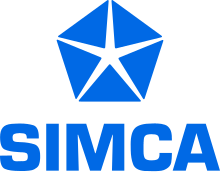 | |
| Company type | Subsidiary |
|---|---|
| Industry | Automotive |
| Founded | 1934 |
| Founder | Henri Pigozzi |
| Defunct | 1970 |
| Fate | Merged into Chrysler Europe becoming a brand in 1970 |
| Successor | Chrysler France |
| Headquarters | Nanterre, France (1935–1961) Poissy, France (1954–1970) |
| Products | Automobiles |
| Brands | Talbot (1959–70) |
| Parent | Fiat S.p.A. (1934–58) Chrysler (1958–67) Chrysler Europe (1967–70) |
| Subsidiaries | Ford France (1954–58) [1] Simca do Brasil (1958–66) |
Simca (Société Industrielle de Mécanique et Carrosserie Automobile; Mechanical and Automotive Body Manufacturing Company) was a French automaker, founded in November 1934 by Fiat S.p.A. and directed from July 1935 to May 1963 by Italian Henri Pigozzi. Simca was affiliated with Fiat and, after Simca bought Ford's French subsidiary, became increasingly controlled by Chrysler. In 1970, Simca became a brand of Chrysler's European business, ending its period as an independent company. Simca disappeared in 1978, when Chrysler divested its European operations to another French automaker, PSA Peugeot Citroën. PSA replaced the Simca brand with Talbot after a short period when some models were badged as Simca-Talbots.
During most of its post-war activity, Simca was one of the biggest automobile manufacturers in France. The Simca 1100 was for some time the best-selling car in France, while the Simca 1307 and Simca Horizon won the coveted European Car of the Year title in 1976 and 1979, respectively—these models were badge engineered as products of other marques in some countries. For instance the Simca 1307 was sold in Britain as the Chrysler Alpine and the Horizon was also sold under the Chrysler brand.
Simca vehicles were also manufactured by Simca do Brasil in São Bernardo do Campo, Brazil, and Barreiros (another Chrysler subsidiary) in Spain. They were also assembled in Australia, Chile[citation needed], Colombia[2] and the Netherlands[3] during the Chrysler era. In Argentina, Simca had a small partnership with Metalmecánica SAIC (better known as de Carlo) for the production of the Simca Ariane in 1965.
- ^ BUSINESS ABROAD: Ford into Simca on Time magazine, Monday, Sept. 27, 1954
- ^ "La historia de Colmotores, pionera de la industria automotriz colombiana". Elcarrocolombiano.com. Retrieved 2019-02-04.
- ^ "Simca and the Nekaf plant". Members.home.nl. Retrieved 2010-11-25.